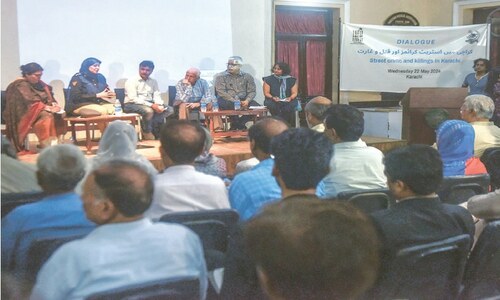KARACHI, July 13: “I wouldn’t compare the French Revolution to the Arab Spring… the French Revolution was a complete revolution and its causes were somewhat different,” said Hidayat Hussain at a programme where he spoke about Victor Hugo’s classic novel Les Miserables.
First published in 1862, Les Miserables is considered among Europe’s greatest literary works. It has been adapted in over 70 films worldwide. Set in the direct aftermath of the French Revolution of 1789, the over 2,000-page book revolves around the characters of Jean Valjean, Bishop Myriel, Fantine, Covette, Monsieur Thenardier and Madame Thenardier, Javert, Marius Pontmercy and Gauroche. It explores the lives of these characters. Most of them seem to be at the worst point in their life, economically and morally, with the backdrop of the French Revolution having just concluded.
The year 2012, which marks the 150th anniversary of the book, is being celebrated as the Year of Les Miserables in France.
It was in this backdrop that Alliance Française de Karachi invited Mr Hussain, who has translated over 57 poems written by prominent Urdu and Sindhi poets into French in his book and often writes for various French newspapers, to speak about the classic novel on Thursday.
He is currently working as the deputy head of commission of the economics department of the French embassy.
“I think that through such events we can offer an insight into French culture,” said Daniel Baillon, the director of Alliance Française de Karachi. “There are universal values that govern mankind that can be taken from this novel. A novel doesn’t carry on as successfully and as long as Les Miserables has if it doesn’t have a timeless message,” he said.
Mr Hussain, a sociologist by education, explored some of the underlying themes of the classic novel. He was of the opinion that Hugo was a great believer in the ‘cleansing effect’ of the French Revolution on society and that he considered Napoleon a usurper and continuer of the revolution.
The speaker shed light on Hugo’s religious philosophy by comparing it to Sufism. “He believed in universal love, a direct relation of man with God and not as an institution, among other things,” elaborated Mr Hussain. He said Hugo communicated the universal message of love. He also quoted Hugo as saying “all of the ways of praying are good as long as they are sincere”. Hugo’s economic philosophy as shown in Les Miserables, according to him, revolved around strengthening individual industries in smaller cities, technical innovation leading to economic development and that an equal ‘distribution of wealth without progress and creation of wealth is a mirage’.














































Dear visitor, the comments section is undergoing an overhaul and will return soon.